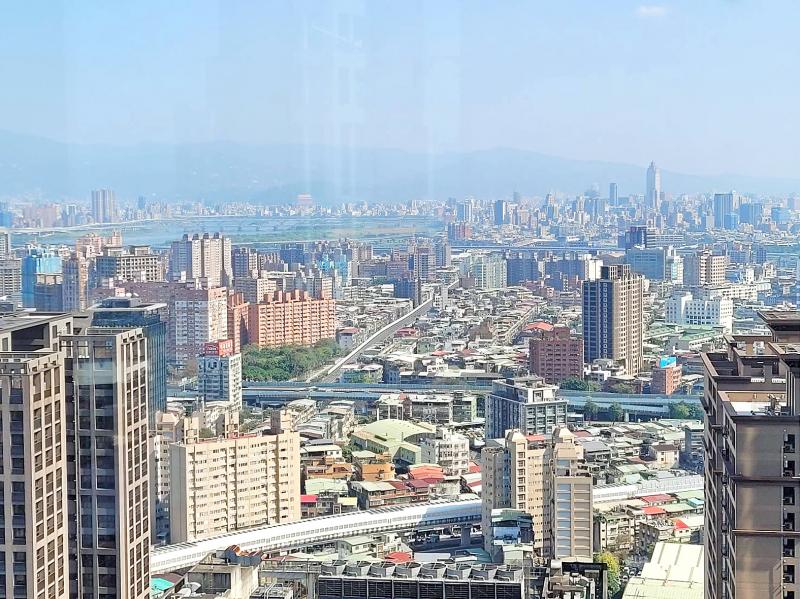New Taipei City has seen an rise in its house purchases this year, as more people are willing to take residence in second-tier locations given the high cost of purchasing a house in the capital and other major locations, Shining Building Business Co (鄉林建設) said yesterday.
As of last month, the number of households in New Taipei City rose by 10,382 from December last year, with the districts of Sinjhuang (新莊), Tamsui (淡水), Banciao (板橋), Linkou (林口) and Tucheng (土城) seeing the largest increases, the company said, citing government data.
Taoyuan and Taichung also reported growth in household numbers during the same period, while Taipei, Tainan and Kaohsiung posted declines, the Taichung-based developer said.

Photo: Lai Hsiao-tung, Taipei Times
Improvements in infrastructure and the relative affordability of homes accounted for the changes, it added.
Housing prices in Taipei are approximately 15.54 times the median annual household income, compared with 12.25 times in New Taipei City, the company said, citing first-quarter statistics from the Ministry of the Interior.
Relative housing affordability and the expansion of MRT lines have made New Taipei City a popular choice for residence, the developer said.
Additionally, major shopping malls, department stores and movie theaters have expanded their presence in second-tier locations to take advantage of their newfound population growth, it said.
Taipei’s population shrank by 44,000 people last year, while losing another 19,000 in the first eight months of this year, posing a threat to consumer activity in the long term, the company said.
Given the growth trend, rezoned areas in New Taipei City are in need of new elementary and junior high schools to accommodate new students, it said.
A rezoned area in Sinjhuang District might soon evolve into a first-tier battleground as it has attracted property investments from major developers such as Huaku Development Co (華固建設), Ruentex Development Co (潤泰新), Pau Jar Group (寶佳機構), Hiyes International Co (海悅) and Shining Building.
Shining Building sold out a presale project in Sinjhuang in the first six months after its launch three years ago. Construction of the project is due for completion by the end of this year.
Housing transactions in Sinjhuang are on the rise because it is home to several government ministries and agencies, as well as being within a convenient distance of the Taiwan Taoyuan International Airport MRT line, the company said.

In Italy’s storied gold-making hubs, jewelers are reworking their designs to trim gold content as they race to blunt the effect of record prices and appeal to shoppers watching their budgets. Gold prices hit a record high on Thursday, surging near US$5,600 an ounce, more than double a year ago as geopolitical concerns and jitters over trade pushed investors toward the safe-haven asset. The rally is putting undue pressure on small artisans as they face mounting demands from customers, including international brands, to produce cheaper items, from signature pieces to wedding rings, according to interviews with four independent jewelers in Italy’s main

Japanese Prime Minister Sanae Takaichi has talked up the benefits of a weaker yen in a campaign speech, adopting a tone at odds with her finance ministry, which has refused to rule out any options to counter excessive foreign exchange volatility. Takaichi later softened her stance, saying she did not have a preference for the yen’s direction. “People say the weak yen is bad right now, but for export industries, it’s a major opportunity,” Takaichi said on Saturday at a rally for Liberal Democratic Party candidate Daishiro Yamagiwa in Kanagawa Prefecture ahead of a snap election on Sunday. “Whether it’s selling food or

CONCERNS: Tech companies investing in AI businesses that purchase their products have raised questions among investors that they are artificially propping up demand Nvidia Corp chief executive officer Jensen Huang (黃仁勳) on Saturday said that the company would be participating in OpenAI’s latest funding round, describing it as potentially “the largest investment we’ve ever made.” “We will invest a great deal of money,” Huang told reporters while visiting Taipei. “I believe in OpenAI. The work that they do is incredible. They’re one of the most consequential companies of our time.” Huang did not say exactly how much Nvidia might contribute, but described the investment as “huge.” “Let Sam announce how much he’s going to raise — it’s for him to decide,” Huang said, referring to OpenAI

The global server market is expected to grow 12.8 percent annually this year, with artificial intelligence (AI) servers projected to account for 16.5 percent, driven by continued investment in AI infrastructure by major cloud service providers (CSPs), market researcher TrendForce Corp (集邦科技) said yesterday. Global AI server shipments this year are expected to increase 28 percent year-on-year to more than 2.7 million units, driven by sustained demand from CSPs and government sovereign cloud projects, TrendForce analyst Frank Kung (龔明德) told the Taipei Times. Demand for GPU-based AI servers, including Nvidia Corp’s GB and Vera Rubin rack systems, is expected to remain high,